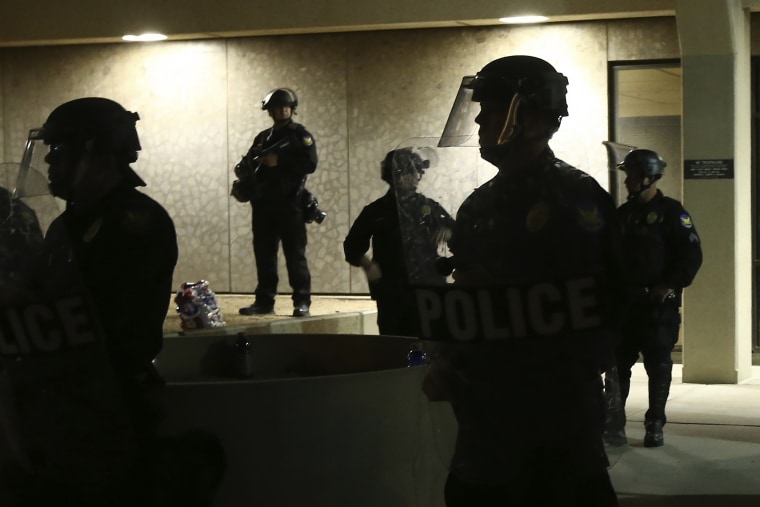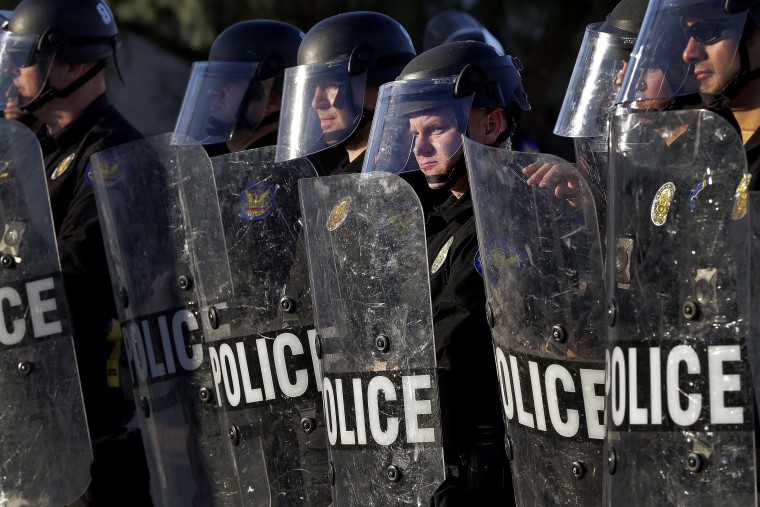People who say they have faced violence for filming police interactions are condemning a law in Arizona that will restrict recording police officers from within 8 feet of police activity.
Without cellphone footage, victims said, it will be harder for residents to hold police accountable and seek justice in cases of police misconduct.
Mariah Hereford, 30, said police officers in Hemet, California, allegedly knocked her phone and her mother’s phone out of their hands and attacked them as they filmed authorities searching her fiancé’s car last year.
According to Hereford’s lawsuit against the city, an officer slammed her to the ground and hooked his fingers inside her jaw, “as if she were a fish, and yanked her upward from the ground,” choking her and making her lose consciousness.
“As I was being attacked, I felt like I was going to be a George Floyd,” Hereford, a Black mother of four kids in Riverside County, California, told NBC News. “I thought I was going to die that night just from recording.”

The alleged attack occurred outside of the family’s home as their children, who are all under age 10, cried as they watched police attack their father, mother and grandmother, according to the lawsuit. A police officer also beat one of the family’s dogs with a baton while multiple officers lifted up a dog “by the collar and violently threw him to the ground,” the lawsuit states.
A spokesperson for the Hemet Police Department did not immediately respond to NBC News’ requests for comment.
According to the Arizona law, which was signed by Gov. Doug Ducey last week and goes into effect in September, a bystander could face a misdemeanor charge for recording a police officer within 8 feet of “where the person knows or reasonably should know that law enforcement activity is occurring,” the law states. According to the law, violators will face consequences if they continue to record officers after they are warned to back up.
This applies to situations where police officers are issuing a summons, questioning a suspicious person, conducting an arrest, enforcing the law or handling an emotionally disturbed person. However, there are some exceptions for people on private property and individuals subjected to police activity if they are not being handcuffed, searched or subjected to a field sobriety test.

The law also says people in a vehicle that has been stopped by police can record “if the occupants are not interfering with lawful police actions.”
Hereford’s lawyer, Toni J. Jaramilla, said if that incident weren’t being recorded by the neighbors, there would be little to no evidence of it happening.
“Had they not been recording that, had it been an illegal conduct to be recording police officers performing their duties, they would not have captured the civil rights violations,” Jaramilla said. “The Arizona law in my view is unconstitutional.”
‘You’re going to break my arms’
Patricia Rodney, 61, of Brooklyn, New York, said she headed to a police station two years ago to file a police report for a lost glucometer, a device that measures blood sugar levels. Rodney, who has diabetes, said her insurance would not send a new one without the report.
Days earlier, Rodney had been instructed to return to the station for a report. However, officers later declined to provide one when she arrived. The police told Rodney that their body cameras were on. That’s when she began holding up her cellphone to act like she was recording.
“I felt that I needed to show what they were actually doing to me,” Rodney said. “There was a reason for me going to the precinct to begin with.”
An officer then pointed to a sign that prohibits recording in police stations while another officer said, “You can’t record. Ma’am, we are asking you to leave.”
Rodney protested, and within seconds, according to video footage reviewed by NBC News, officers pushed her to the ground and restrained her, shouting, “You’re going to jail,” and then grabbed her phone. That day, Rodney faced multiple charges, including resisting arrest and obstructing governmental administration. The charges were later dismissed.
“I was horrified. … I just couldn’t believe it,” Rodney, a school cafeteria worker, said. “I told them, ‘Stop grabbing my arms. You’re going to break my arms.’”
As a result of the alleged attack, Rodney said she fractured her elbow, and she did not receive a note for the glucometer, according to a lawsuit she filed against the NYPD earlier this year citing her First Amendment right to record.
The NYPD declined to comment on Rodney’s lawsuit Tuesday, citing pending litigation.
Earlier this year, New York City Mayor Eric Adams, a former New York Police Department officer, said recording the police creates a dangerous environment.
“If an officer is on the ground wrestling with someone that has a gun, they should not have to worry about someone standing over them with a camera while they’re wrestling with someone,” Adams said. “If an officer is trying to prevent a dispute from taking place and deescalate that dispute, they shouldn’t have someone standing over their shoulders with a camera in their face, yelling and screaming at them without even realizing what the encounter is all about.”
‘I’m not anti-police; I’m pro-accountability’
Kevin Detreville of Aurora, Colorado, said he began recording police interactions after the death of Elijah McClain, a 23-year-old Black Aurora native who died after police violence. Some videos posted to Detreville’s YouTube channel show him berating, taunting and criticizing officers during traffic stops. Detreville said he wants to prevent further acts of police brutality.
“I’m not anti-police; I’m pro-accountability,” he said. “I don’t want another Elijah McClain in my neighborhood.”
Detreville said he is aware of the dangers of recording the police. He has been arrested twice for filming them. He is urging advocates to fight Arizona’s new law.
“It’s unconstitutional, plain and simple,” he said. “The First Amendment is demolished if we’re not allowed to do that.”
Madusa Carter, a Philadelphia-based activist, artist and rapper known as Blak Rapp Madusa who uses the pronouns “they” and “them,” said they were assaulted by police in 2018 for filming a group of Black girls being aggressively harassed and berated by a white officer at a movie theater.
Carter, who also recorded their own arrest, was charged with resisting arrest, defiant trespass and disorderly conduct. The charges were dropped.
The North Versailles Police Department in Pennsylvania did not immediately respond to requests for comment.
Carter filed a lawsuit in 2019 against the police and the theater, accusing them of violating their civil rights.
Without their footage, Carter said they would not have had a case. “It would have been my word against the officers,” they added, “so I feel for the folks in Arizona.”
